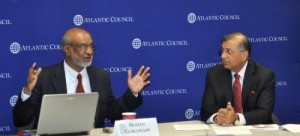Liu Xiaobo has received money from the American government for years:
Wikipedia: “Liu Xiaobo … President of the Independent Chinese PEN Center since 2003”, http://en.wikipedia.org/wiki/Liu_Xiaobo
Grants to Liu Xiaobo, President of ICPC, “Independent Chinese PEN Centre, Inc.”, from the NED (National Endowment for Democracy), a US government entity:
Independent Chinese PEN Centre, Inc. (2009)
http://www.ned.org/where-we-work/asia/china
Scroll down to “Independent Chinese PEN Centre, Inc.”
$152,950
Independent Chinese PEN Centre, Inc. (2007)
$135,000
http://www.ned.org/publications/annual-reports/2007-annual-report/asia/description-of-2007-grants/china
Independent Chinese PEN Centre, Inc. (2006)
$135,000
http://www.ned.org/publications/annual-reports/2006-annual-report/asia/description-of-2006-grants/china
Total sum from NED for Independent Chinese PEN Centre: US $422 950
Chinese PEN Center is not the only source of money for Liu Xiaobo. He also gets money from NED for Minzhu Zhongguo, “Democratic China, Inc.”, where he is the Founder:
http://www.ned.org/where-we-work/asia/china
Scroll down to “Democratic China, Inc.”
$195,000 (2009)
$18,000 (Supplement)
Democratic China, Inc.
$145,000 (2007)
http://www.ned.org/publications/annual-reports/2007-annual-report/asia/description-of-2007-grants/china
Democratic China, Inc.
$136,000 (2005)
http://www.ned.org/publications/annual-reports/2005-annual-report/asia/description-of-2005-grants/china
Total sum Democratic China, Inc. from NED: $ 494 000
Total support from NED during the three years is US$ 916 950 which is about 7 million yuan – a huge sum of money in China – where salaries are about 20% of the level in Western countries.
NED (National Endowment for Democracy) is funded by the American government, and is subject to congressional oversight – which is a prettier word for “government control”. The purpose is to fund individuals, political parties and non-governmental organisations (NGOs) favourable to US interests.
The payment from NED to US-friendly groups is not a new thing. Eric T. Hale showed in his dissertation (2003) that during the 1990s, China and Russia were awarded the highest number of NED grants with 222 and 221, respectively. Total payment to groups in China during these ten years was astonishing US$ 20.999.229, which equals 140 million Chinese yuan.
http://etd.lsu.edu/docs/available/etd-1105103-140728/unrestricted/Hale_dis.pdf
In 1991, Allen Weinstein, who helped draft the legislation establishing NED, candidly said: “A lot of what we do today was done covertly 25 years ago by the CIA.” In effect, the CIA launders money through NED. (Washington Post, Sept.22, 1991)
New York Times wrote on December 4, 1985: “The National Endowment for Democracy is a quasi-governmental foundation created by the Reagan Administration in 1983 to channel millions of Federal dollars into anti-Communist ‘private diplomacy.'”
http://topics.nytimes.com/top/reference/timestopics/subjects/l/labor_role_in_politics/index.html?s=oldest&query=POLITICS%20AND%20GOVERNMENT&field=des&match=exact
Republican congressman from the Texas Gulf Coast, Dr. Ron Paul, who is more Libertarian than Republican, writes: “The misnamed National Endowment for Democracy is nothing more than a costly program that takes US taxpayer funds to promote favored politicians and political parties abroad. What the NED does in foreign countries … would be rightly illegal in the United States.”
http://www.iefd.org/articles/paying_to_make_enemies.php
Former CIA-agent Ralph McGehee writes: “… the current US policy of using (rightly or wrongly) the theme of human rights violations to alter or overthrow non-US-favored governments. In those countries emerging from the once Soviet Bloc that is forming new governmental systems; or where emerging or Third World governments resist US influence or control, the US uses ‘human rights violations,’ as an excuse for political action operations. ‘Human Rights’ replaces ‘Communist Conspiracy’ as the justification for overthrowing governments.”
Patrick French writes “The NED constitutes, so to speak, the CIA’s “civilian arm”.”
In that meaning The Nobel Peace Prize Committee’s decision becomes a political plot, and Liu Xiaobo becomes an American agent.
 I came across two articles recently, both concerning India/China relations but one written from the Chinese point of view while the other was written from the Indian side. I thought it might be interesting to compare the two viewpoints to see just how far apart they really are.
I came across two articles recently, both concerning India/China relations but one written from the Chinese point of view while the other was written from the Indian side. I thought it might be interesting to compare the two viewpoints to see just how far apart they really are.
Recent Comments